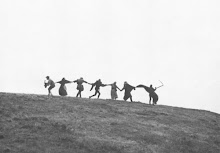 The single greatest political influence of Jesse James' youth was the Civil War. He grew up in Missouri, where the population was split, one side secessionists who wanted to join the South, and one side with the North. James' family were slaveholders and staunchly for the Confederates; his older brother Frank even joined a guerrilla operation and took part in various atrocities on behalf of the Confederate side. The state was a microcosm of the war itself, with citizens fighting one another and ratting each other out to the gangs of thugs and armies who roamed the state.
The single greatest political influence of Jesse James' youth was the Civil War. He grew up in Missouri, where the population was split, one side secessionists who wanted to join the South, and one side with the North. James' family were slaveholders and staunchly for the Confederates; his older brother Frank even joined a guerrilla operation and took part in various atrocities on behalf of the Confederate side. The state was a microcosm of the war itself, with citizens fighting one another and ratting each other out to the gangs of thugs and armies who roamed the state. By the end of the war James was thoroughly inured to violence of all kinds, and in fact himself joined a bushwhacker gang that harassed authorities who disagreed with Confederate politics. It is likely that his gang committed the first peacetime armed robbery in the United States. When the leader was killed, surviving members continued to rob banks and, in the course of these activities, James killed a cashier whom he mistook for a wartime enemy; that was the first time his name got into the papers. He came to the attention of a journalist named John Edwards, who had a political agenda that was served by publishing stories about James' daring feats, giving his image a Robin Hood spin by de-emphasizing violence, emphasizing robberies of large institutions or payrolls, and above all emphasizing their affiliation with the Confederates and hostility toward the North. Jesse and his brother Frank formed the James-Younger gang and roamed the southern states, robbing banks with prominent Union or Republican shareholders, getting good notices in the papers, and often being helped and shielded by South-sympathizers along the way.
The Pinkerton Detective Agency was hired to deal with them, and founder Allan Pinkerton took the case on personally. He staged a raid on the James family home; it turned into a fiasco when they threw a bomb into the house, killing James' younger half-brother and blowing off his mother's arm. When the story made the papers, the James-Younger gang gained even more popularity with the public, and Jesse James was confirmed as a sympathetic figure in the public imagination.
Eventually James became paranoid. Most of his old guerrilla comrades were dead; he didn't trust the new recruits. He was right. One recruit, Bob Ford, was secretly negotiating with the Missouri governor to bring James in.
On the morning of April 3, 1882, Ford, his brother, and James were getting ready for another robbery. They had just eaten breakfast. It was a hot day, and James removed his coat and guns. He noticed a picture on the wall was dusty, and stood on a chair to clean it. Bob Ford pulled out a gun and shot him in the back of the head.
When the Ford brothers went to the authorities to collect their reward, they were shocked to find themselves charged with murder. They were tried and sentenced to death by hanging, but immediately given a full pardon by the Missouri governor. They did manage to collect part of their reward, but had to leave Missouri due to their great unpopularity. Charley Ford committed suicide two years later, and Bob Ford was killed by a gun ten years later.
Meanwhile Jesse James was buried under a tombstone that reads, In Loving Memory of my Beloved Son, Murdered by a Traitor and Coward Whose Name is not Worthy to Appear Here.
Frank James surrendered to the Governor of Missouri five months later. He placed his holster in the Governor's hands, saying, "I have been hunted for twenty-one years, have literally lived in the saddle, have never known a day of perfect peace. It was one long, anxious, inexorable, eternal vigil." He then ended his statement by saying, "Governor, I haven't let another man touch my gun since 1861."
Frank was tried for two robberies and murders, and acquitted on both counts. The evidence was overwhelming, but his character witnesses included a Confederate General and no Missouri jury was going to sentence him. He lived another 30 years, working as a salesman, security guard, and telegraph operator, among other jobs. He also did public appearances, even giving tours of the James family farm for 25 cents. He died in 1915 at the age of 72.
Source: Wikipedia



No comments:
Post a Comment